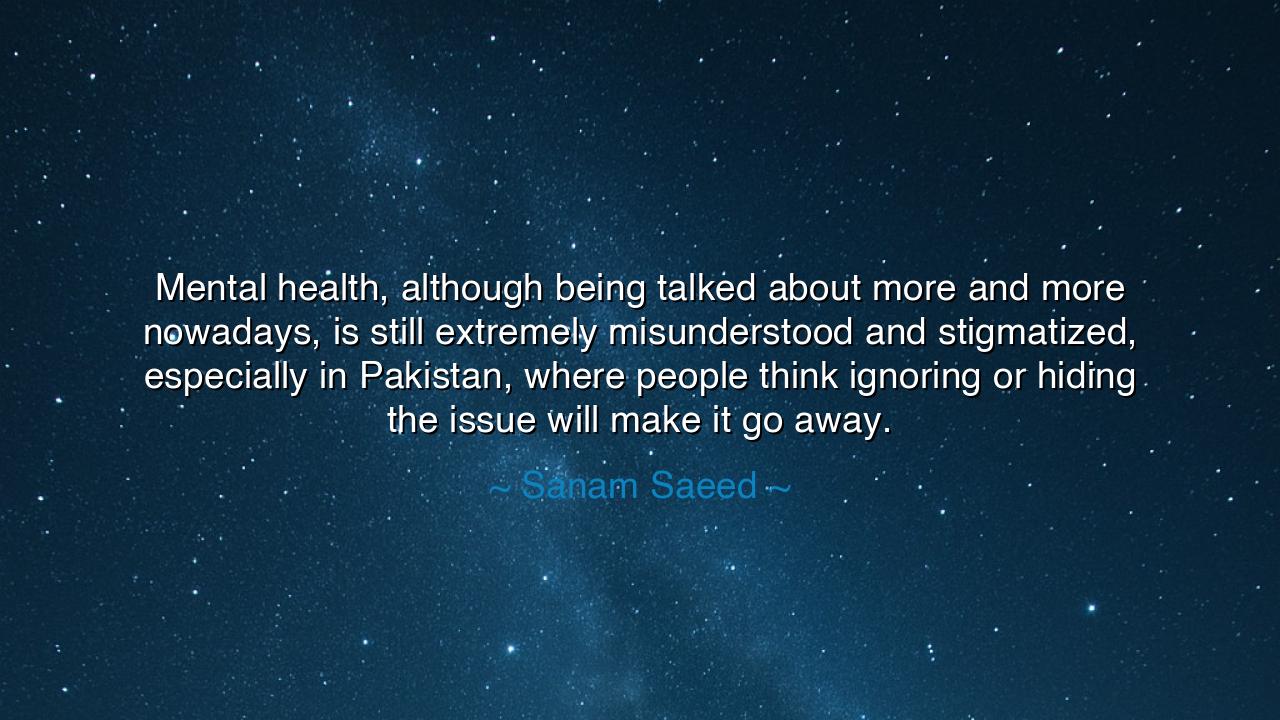
Mental health, although being talked about more and more
Mental health, although being talked about more and more nowadays, is still extremely misunderstood and stigmatized, especially in Pakistan, where people think ignoring or hiding the issue will make it go away.






In an age where the mind has become both sanctuary and battlefield, Sanam Saeed spoke with rare courage and clarity: “Mental health, although being talked about more and more nowadays, is still extremely misunderstood and stigmatized, especially in Pakistan, where people think ignoring or hiding the issue will make it go away.” Her words, though shaped by the pain of her homeland, echo the struggle of the human spirit everywhere. For she speaks not only of a nation, but of the world’s collective blindness—the ancient habit of turning away from invisible wounds.
The origin of this quote lies in the actress’s own journey, for Sanam Saeed, a voice of strength and authenticity in Pakistani art, has long used her platform to reveal the unseen battles of the soul. In a culture where silence is mistaken for strength and suffering for shame, she names the truth few dare to utter: that mental illness is not weakness, and that denial is not healing. Her lament unveils a universal pattern—how societies cloak discomfort in denial, hoping that what they refuse to name will vanish like smoke. Yet, as every sage knows, the pain we conceal does not die; it grows in the dark, waiting for light to set it free.
Even the ancients, with their temples and philosophies, knew of the storm within. In the great city of Athens, physicians of the school of Hippocrates taught that the mind, too, could fall ill, just as the body might weaken. They spoke of “melancholia,” the black bile of the soul, and they treated it not with scorn but with care—with herbs, music, and dialogue. But as time marched on and empires rose and fell, fear returned, and with it, ignorance. Madness became sin; sorrow became secrecy. And so, in many lands—including Pakistan today—the ancient understanding has been buried under layers of taboo.
Saeed’s words rise, then, as a rekindling of that ancient light—a call to remember that the mind is sacred, and that to heal it is an act of honor, not disgrace. When she speaks of stigmatization, she names a chain forged not of metal but of silence: families who hush their children’s cries, elders who dismiss despair as weakness, neighbors who whisper rather than listen. These are not evildoers, but people lost in misunderstanding, unaware that by hiding pain, they feed it. The result is generations trapped between suffering and silence, between fear and façade.
Consider the story of Princess Diana, whose grace before the world hid a deep and private anguish. She dared to speak of her depression and bulimia at a time when few in power would confess such things. Her honesty did not make her fragile—it made her immortal. For in breaking her silence, she gave millions permission to speak their own truths. So too, when Sanam Saeed speaks for those silenced by shame, she steps into that same lineage of courage—the warriors who fight not with swords, but with truth.
The wisdom within her words teaches us that to heal a nation, one must first heal its mindset. The people must learn to see the unseen—to treat mental health not as a curse, but as a shared human reality. The lesson is clear: ignoring suffering does not banish it—it magnifies it. A wound left untended festers; a mind left unheard grows dim. If we wish for peace in our homes and strength in our societies, we must make room for honest speech—for the tear not hidden, the fear not mocked, the heart not silenced.
So, let this be the counsel to all who hear: when one around you suffers, do not turn away in discomfort; turn toward them in compassion. Ask, listen, and understand. Speak of mental health as you would of any illness, for it is neither shameful nor strange—it is human. Build communities where confession is not punished, but welcomed. Let schools teach the art of empathy as they teach the art of reason. And above all, remember that healing begins not in medicine, but in understanding.
For as Sanam Saeed reminds us, a society that hides its wounds cannot call itself whole. To face the darkness within is the most ancient and noble of human acts. May her words endure like a flame passed down through generations—a light against stigma, a voice against silence, and a reminder that true strength is not in denial, but in the courage to be seen.






AAdministratorAdministrator
Welcome, honored guests. Please leave a comment, we will respond soon